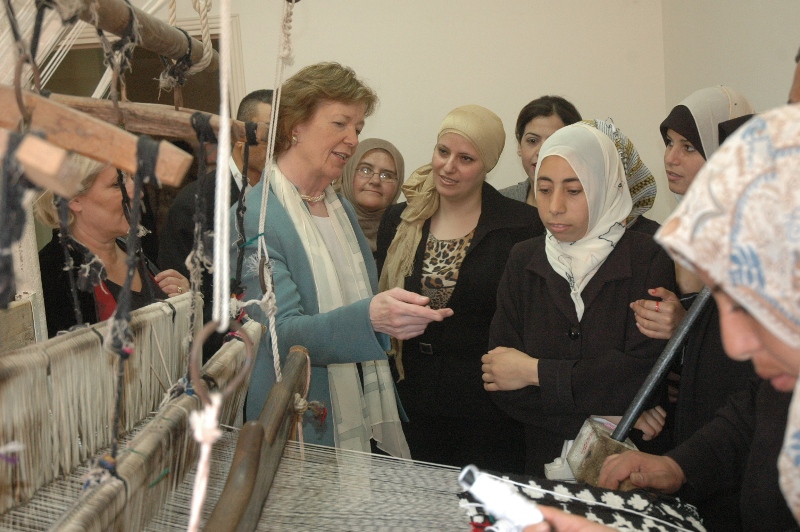Human Rights and the New Economy

Human Rights and the New Economy
Uniting Around Workers' Rights
I.M.O.W. Global Council member Mary Robinson argues that a time of economic crisis is a perfect opportunity for improving labor conditions for workers across the world--men and women alike. Previously, Robinson worked as the United Nations High Commissioner for Human Rights, and served as the president of Ireland. Robinson currently heads up Realizing Rights: The Ethical Globalization Initiative.
Imagine that we live in a world characterized by an entirely new and different approach to economic activity. In this world, all individuals can effectively demand the fulfillment of their right to decent work--just and favorable working conditions and fair pay. In this world, those toiling in the informal economy are visible and have a voice, and every worker can identify systems of social protection and support so that no one falls below a minimum threshold of dignity and rights.
Imagine a time when governments and multinational corporations work directly with communities to provide all workers with access to decent jobs and decent lifestyles. In this time, women are viewed as agents of social and economic change, and are empowered participants in policy discussions. The world-at-large recognizes--indeed, benefits--from women's leadership and potential. This is the era we want to reach.
The way we get there is by putting human rights at the center of a new economic model.
The Universal Declaration of Human Rights affirms that, "Everyone has the right to work, to free choice of employment, to just and favorable conditions of work, and to protection against unemployment." Unfortunately (and especially in today's difficult economic climate), many are left without opportunities to work, let alone decent work, or must work inordinate hours just to get by. Women especially have felt acutely the effects of this economic downturn. According to the Director-General of the International Labor Organization (ILO), the economic crisis may result in as many as 22 million unemployed women in 2009. Current gender inequalities in employment will likely be amplified, with precarious work expanding at the expense of good jobs. Women who work within informal economies characterized by lesser wages and reduced social protection tend to be most immediately affected by downturns like our present one, and they must often wait the longest to recover financially (1).
Human rights are most at risk in times of crisis, as UN Secretary-General's Special Representative for Business and Human Rights John Ruggie has affirmed (2). Businesses may be motivated to lower human rights standards to increase profits in the short term, and unemployed individuals struggle even more acutely to provide for themselves and their families.
It is in this time of crisis, however, that we have a great opportunity: As our leaders take steps to rebuild our economy, we can call on them to recognize that the concept of decent work is more than an aspirational goal--it is a minimum social floor which governments and others are obliged to progressively realize. We can call on all economic players to safeguard the human rights that crises threaten. And when we make our call for more jobs in this difficult economic period, we can also stand up to demand better jobs--jobs that do not force workers or societies to make a trade-off between earning basic wages and realizing basic rights.
Indeed, we must make it common knowledge that economic gain need not be in conflict with a dedication to protecting the human rights of all. The ILO and International Finance Corporation (IFC) have determined, through a joint initiative called the Better Work program, that countries which respect labor rights are in fact better positioned to build up more sustainable growth, development and exports.
As corporations play larger roles in managing our world's finances, they must assume proportional degrees of accountability and responsibility for safeguarding the human rights of those working in their value chains. This can happen by demonstrating commitment to understanding how their business operations impact human rights; providing regular updates on their progress in addressing human rights concerns; and adopting systems that are transparent and allow for public scrutiny of outcomes.
The organization of which I am president, Realizing Rights: The Ethical Globalization Initiative, works to bring human rights to the center of global governance and policymaking and ensure that the needs of the poorest and most vulnerable are addressed on the global stage. As an organization, we promote equitable trade and development policies that lead to decent work opportunities for all, and we work with governments, companies, and communities to bring economic activity into harmony with attentiveness to human rights. We participate in efforts spearheaded by the Business and Human Rights Resource Center to encourage private enterprises to adopt rights-conscious policies, for instance, and we have joined forces with the Global Reporting Initiative (GRI) and the UN Global Compact to begin tracking company performance through public monitoring and reporting. We recognize that human rights standards take on practical meaning for individuals when equitable trade and development policies lead to decent work opportunities for all.
We also work to highlight the many ways in which women's leadership and women's voices contribute to the changes outlined above. The Monrovia Declaration, which emerged from consultations at the International Colloquium on Women's Empowerment, Leadership Development, International Peace and Security held in March 2009 in Liberia, calls for "a paradigm shift in our approach to global security and development that puts women at the center of social and economic policies and political change." We called on governments to target women's economic empowerment by earmarking funds for women in all responses to the financial crisis, including recovery and stimulus packages, and to ensure that appropriate delivery mechanisms are in place and functioning to channel trade financing to women.
In Liberia, we work with governments, civil society groups and the private sector to create more decent work opportunities and to reach better development and human rights outcomes from public and private investment. We are also helping to develop the Angie Brooks International Center on Women's Empowerment, Leadership Development and Peace and Security, which will serve as a resource in Liberia for education, training, dialogue and social programming to help Liberian women realize a more secure economic and political future.
When we succeed in placing human rights standards at the heart of global governance and policy development, we come one step closer to an economic model that is accountable to the world's people, and to the vision of Article 1 of the Universal Declaration of Human Rights agreed by the world's governments sixty years ago: all human beings are born free and equal in dignity and rights.
REFERENCES:
1. International Labour Organization, press release (May, 5, 2009).
2. John, G. Ruggie, "Presentation of Report to United Nations Human Rights Council," (June 2, 2009).



